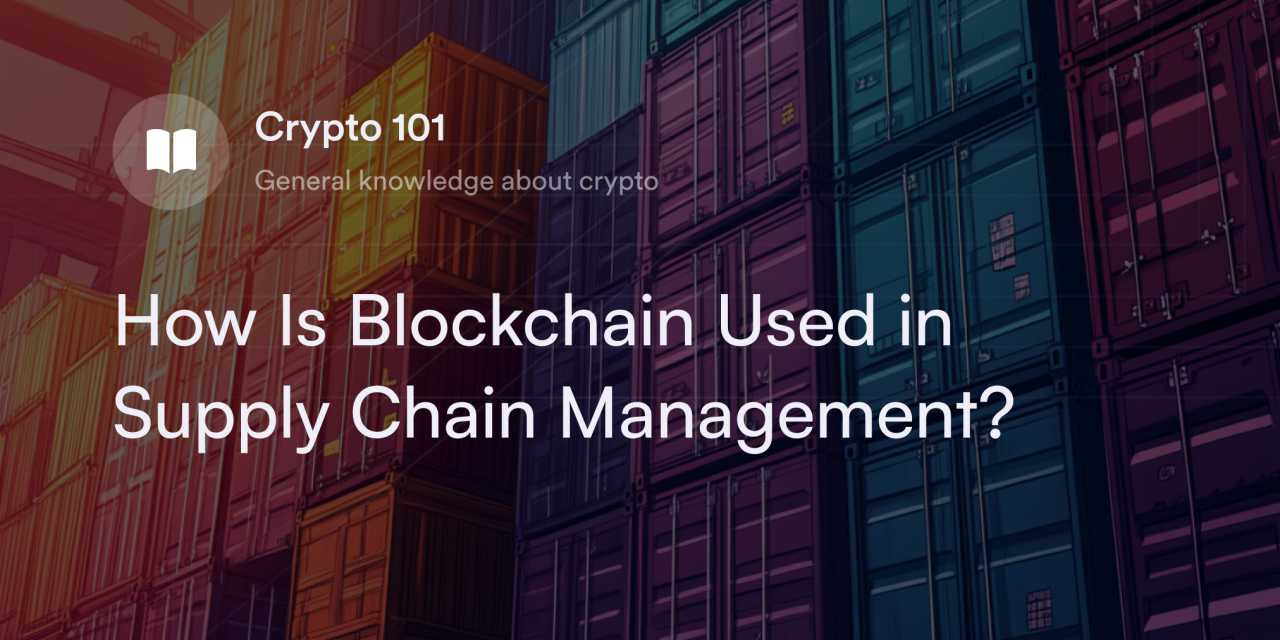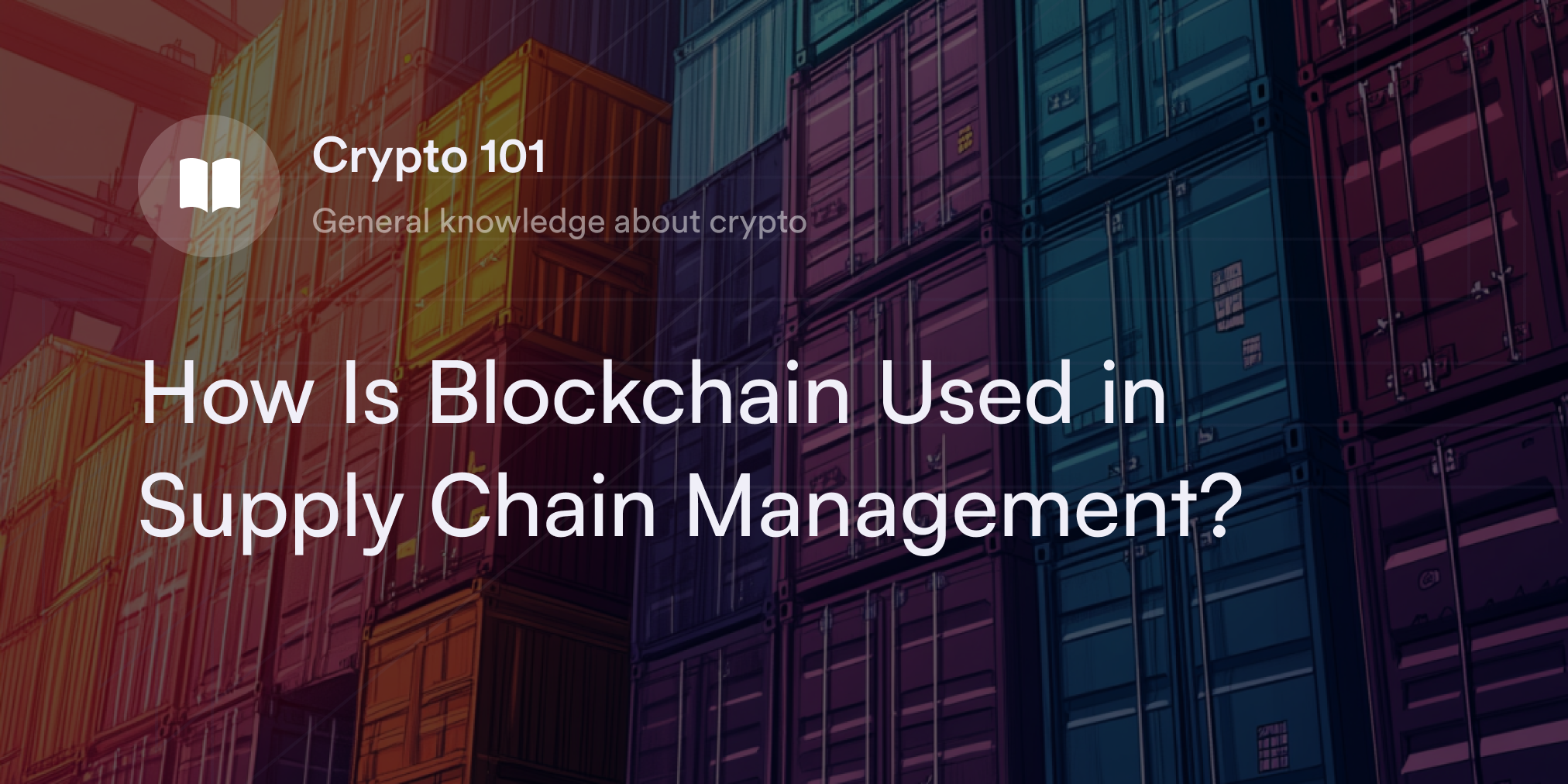


Blockchain began with Bitcoin (BTC), but its potential extends far beyond the cryptocurrency market. Although this new form of distributed digital ledgers is commonly associated with transferring virtual coins on peer-to-peer (P2P) platforms, industries outside the financial sector are investigating the technology's value props.
According to Deloitte researchers and the Harvard Business Review, blockchain is the next big breakthrough for supply chain logistics, and giants like IBM, Walmart, and Coca-Cola have already begun integrating blockchain into their supply chain systems.
If the trend toward blockchain tech persists, it's set to play a foundational role in the globalized economy. Let’s find out how and why more companies want to bring supply chains on-chain.
What is supply chain management?
Before diving into how blockchain transforms supply chains, let’s review the concept of supply chain management.
Supply chain management tracks and optimizes the flow of raw materials and manufactured goods between businesses, manufacturers, and customers. A successful supply chain management team knows where everything a vendor and supplier needs is at every stage of its life cycle—ranging from procurement and production to transportation and distribution.
In addition to keeping track of the flow of goods and services in a centralized database, supply chain managers work to ensure their clients operate at peak efficiency with fast transit speeds and minimal expenses. Supply chain management teams constantly scan the flow of products in and out of a business to find potential inefficiencies and introduce cost-saving, time-saving, or scalability solutions.
How does blockchain fit into supply chains?
Blockchain gives supply chain managers a decentralized way to send and store digital data between their suppliers, retailers, and lenders on shared ledgers. Unlike open-source blockchains like Bitcoin and Ethereum (ETH), clients interested in blockchain supply chains often turn to restricted permissioned blockchains, which limit access and node operation to pre-screened clients and stakeholders. Transaction data on permissioned blockchains isn't publicly viewable to a global audience but provides transparency to those involved in a supply chain management team.
Instead of relying on centrally controlled servers, permissioned blockchains don't have a single point of failure in their network of nodes and provide supply chain members with an immutable copy of the entire transaction history.
Plus, thanks to tokenization, supply chain managers represent real-world assets, contracts, or services in digital tokens and send them throughout the blockchain to initiate an action, complete a payment, or transfer ownership rights. All the data stored on blockchains is tamper-resistant and transparent by nature, providing supply chain managers an easy way to hold counterparties accountable and monitor the flow of goods for more accurate forecasting.
Use cases for blockchain technology in supply chains
Supply chain managers have only begun experimenting with adding blockchain systems to their logistics, but a few categories exist where the technology shows the most promise. From tracing the source of issues to tracking the authenticity of materials, blockchains have many use cases in supply chain management. Here are a few:
Provenance tracking
In supply chain management, provenance tracking refers to tracing and verifying the origin, authenticity, and journey of products from their source to the end consumer. Since blockchains use public, immutable, and distributed ledgers to record transactions, they provide a clear view throughout the sourcing, manufacturing, and distribution stages of a product's lifecycle. This enhanced provenance tracking makes it easier for companies to verify the authenticity of their goods and estimate their expected arrival.
Issue spotting and recall management
When issues arise (e.g., food contamination or a defective product), the complete record of transactions on a blockchain helps managers identify the source of the problem and navigate through a crisis smoothly.
Blockchains also help target any affected product batches, making the recall process more efficient.
Real-time inventory management
Supply chain managers get a bird’s-eye view into their current inventory levels on blockchains, which helps optimize stock levels, prevents stockouts and excess inventory, and potentially reduces storage costs. The transparency and accuracy of real-time inventory data contribute to a more agile and responsive supply chain ecosystem.
Cold chain monitoring
Items such as pharmaceuticals or perishable food must stay in a consistently cold environment to maintain their integrity and avoid risks such as spoilage. With blockchain's high traceability standards, supply chain managers have ways to monitor and record temperature-sensitive storage facilities to comply with regulatory standards and ensure the quality and safety of their products.
In fact, with technologies like blockchain oracles, sharing off-chain data like temperatures from digital thermometers with on-chain networks to alert stakeholders of any potential issues is possible.
Contractual agreement automation
With self-executing smart contract commands, managers have the flexibility to automate tasks on their supply chain blockchain, including payment settlements, delivery updates, and order fulfillment. By relying on intermediary-free smart contracts to enforce agreements, supply chains have lower administrative overhead and a reduced risk of manual errors.
Cross-border transactions and document authentication
Blockchain is a borderless technology. As long as stakeholders synchronize with their supply chain's software, they enjoy visibility into critical details on international trade, including customs clearance, compliance records, and the movement of goods. By sharing info in one decentralized database, blockchain simplifies the flow of products between nations.
Benefits of using blockchain in supply chains
No matter the company, blockchain logistics helps supply chain managers glean more insights into their processes and collaborate with stakeholders. The more efficient and cost-effective blockchain makes supply chains, the more likely customers enjoy a simple and streamlined delivery experience.
Here are a few advantages of adding blockchain tech to a supply chain:
Increased transparency and traceability
A major value prop of using blockchain in supply chain management is its real-time visibility into provenance tracking. This transparency ensures everyone on the network has a complete record of a product's life cycle, which fosters trust among participants and eliminates miscommunications, discrepancies, or information asymmetries.
Blockchain's traceability also helps identify the origin of any issues in supply chains (e.g., defects, delays, or contamination) to promptly resolve crises and comply with regulatory requirements.
No single point of failure
Because blockchains use decentralized networks of nodes—and each node contains a copy of the entire transaction history—they don't have central points of attack such as a data center or cloud server.
Another benefit of blockchain's unique design is that it has 24/7 uptime, unlike centralized systems that often have downtime due to maintenance and upgrades.
Better tamper-resistance
Each block on a blockchain contains a cryptographic hash from the previous block of transactions, so it's extremely difficult for malicious actors to alter (or tamper with) prior transactions.
The tamper-resistance built into blockchain systems provides supply chain managers with a verifiable record of every event on their blockchain, which cuts the odds of fraud and bolsters the network's integrity.
Efficient and better cost reduction
The real-time synchronization and visibility from blockchains provide more opportunities for cost savings analysis, such as pinpointing inefficiencies, avoiding inventory issues, and accurately forecasting demand.
Plus, with smart contract automation, supply chain managers significantly reduce overheads for administration and paperwork, speeding up supply chains and slimming down capital expenses.
Challenges of implementing blockchain into supply chains
Blockchains seem to be a slam dunk for supply chains and consumers, but managers can't update legacy systems with the flip of a switch. Although more businesses are getting involved with blockchain logistics, there are hurdles to making this technology the norm in global supply chain management.
Integration complexity and interoperability
Coordinating a move to a blockchain-based system requires considerable effort, funding, and IT expertise to synchronize every stakeholder's supply chain infrastructure. While blockchain’s efficiencies bring attractive benefits, managers sometimes feel uncomfortable making the high initial investment to deploy these systems.
Also, due to the unique coding standards on separate blockchains, it's difficult for different decentralized protocols to transfer non-native digital data (aka the interoperability problem).
Lack of standardization
Since blockchain is still trickling into supply chain management, there aren't clear industry-wide standards for implementing this technology into day-to-day operations. Without clear and widely accepted procedures for integrating blockchain technology, stakeholders often have incompatible systems and experience more roadblocks than benefits.
Data privacy and security concerns
Although one of blockchain's selling points is its transparency, its openness creates new security issues for supply chain managers. For example, supply chain data often includes sensitive details such as trade secrets and personal IDs, making it a valuable target for malicious actors and competitors.
There's also the threat of code malfunctions or smart contract exploits, which expose supply chains to significant disruptions and unauthorized transactions.
Resistance to change and educational hurdles
It's common for supply chain managers to get "stuck in their ways" as they become familiar with their existing software systems. Even if stakeholders understand the potential benefits of using blockchains, they may be resistant to put forth the time and effort to re-learn their digital systems and re-train team members.
Explore more use cases for crypto on dYdX Academy
Cryptocurrency was just the start of the blockchain revolution. From supply chains and financial services to gaming and real estate, there's no end to the fields dipping their toes into Web3. Eligible traders looking to stay one step ahead of the decentralization disruption must check out dYdX Academy for more easy-to-read guides on breakthroughs in blockchain tech. Also, for eligible traders interested in derivatives trading, dYdX offers a decentralized trading platform for crypto perpetuals. Learn more about how dYdX works and our latest upgrades on our official blog, and start trading on dYdX today.
Disclosures
The content of this article (the “Article”) is provided for general informational purposes only. Reference to any specific strategy, technique, product, service, or entity does not constitute an endorsement or recommendation by dYdX Trading Inc., or any affiliate, agent, or representative thereof (“dYdX”). Use of strategies, techniques, products or services referenced in this Article may involve material risks, including the risk of financial losses arising from the volatility, operational loss, or nonconsensual liquidation of digital assets. The content of this Article does not constitute, and should not be considered, construed, or relied upon as, financial advice, legal advice, tax advice, investment advice, or advice of any other nature; and the content of this Article is not an offer, solicitation or call to action to make any investment, or purchase any crypto asset, of any kind. dYdX makes no representation, assurance or guarantee as to the accuracy, completeness, timeliness, suitability, or validity of any information in this Article or any third-party website that may be linked to it. You are solely responsible for conducting independent research, performing due diligence, and/or seeking advice from a professional advisor prior to taking any financial, tax, legal, or investment action.
You may only use the dYdX Services in compliance with the dYdX Terms of Use available here, including the geographic restrictions therein.
Any applicable sponsorship in connection with this Article will be disclosed, and any reference to a sponsor in this Article is for disclosure purposes, or informational in nature, and in any event is not a call to action to make an investment, acquire a service or product, or purchase crypto assets. This Article does not offer the purchase or sale of any financial instruments or related services.
By accessing this Article and taking any action in connection with the information contained in this Article, you agree that dYdX is not responsible, directly or indirectly, for any errors, omissions, or delays related to this Article, or any damage, injury, or loss incurred in connection with use of or reliance on the content of this Article, including any specific strategy, technique, product, service, or entity that may be referenced in the Article.







